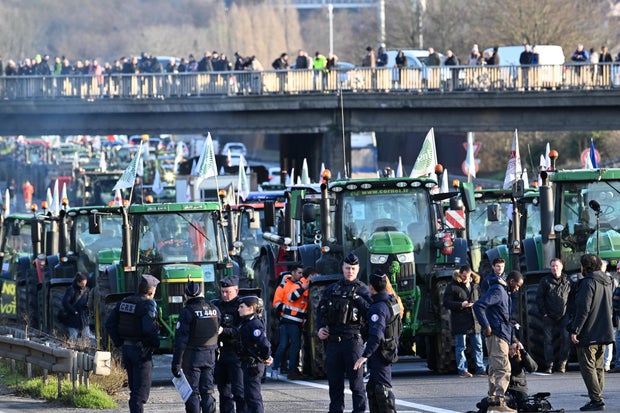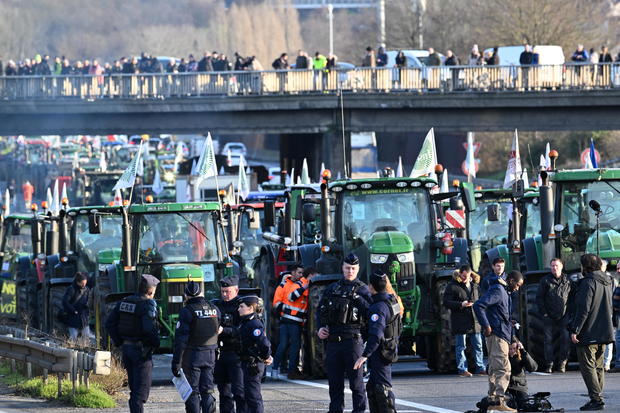Paris — French farmers angry over increased taxes and European agriculture policies they say threaten their livelihoods were on the roads well before dawn Wednesday, blocking highways and access roads to Paris. The protests, now about two weeks old, brought traffic to a standstill in many places as tractors blocked lanes or entire sections of highways for miles, and 18 people were arrested Wednesday.
The farmers remained determined to keep up pressure on France’s government to change its policies, and there was no sign of an imminent end to their blockades encircling the capital. They advanced Wednesday toward Orly airport, south of Paris, and other major cities and towns, including Lyon in the east and Toulouse in the southwest.
What are French farmers protesting?
In addition to the increased tax burden and European agriculture policies that they say are threatening their ability to survive, the French farmers also want more concessions from the government to combat rising costs of fuel and animal feed.

Mustafa Yalcin/Anadolu/Getty
Many complain, too, that some big supermarket chains are paying them below market rates for their products so they can offer cut-price deals to shoppers. The government has already threatened to fine suppliers that engage in unfair practices at the cost of farmers.
One of the places the farmers wanted to reach was the huge Rungis wholesale food market south of Paris, where supermarkets, stores and restaurants go to buy their supplies. As the farmers tried to enter the 578-acre site Wednesday morning, they were turned back by police at the gates and 18 people were arrested. But that didn’t stop others parking their trucks or tractors by the entrance and promising to stay overnight if need be.
Later in the day, some farmers managed to get inside the market complex. Police arrested dozens, taking the total number arrested at Rungis on Wednesday to 79.
There were police cordons on highways all around Paris as the farmers tried to advance. Interior minister Gérald Darmanin said the farmers would not be forced back, but stressed it was “out of the question” that they be allowed to block the capital.
In many places, farmers took to smaller roads and even country lanes in a game of cat and mouse with police and other authorities.
Peaceful protests, with a lot of support
Both sides stressed that the movement was remaining peaceful. A few farmers said they felt they were being given a police escort rather than threatened, as national Gendarmerie forces drove alongside them, ready to turn them off onto a different route if they got too close to the limits set by the interior minister.
There has been strong support from the public for the farmers, despite many finding travel plans disrupted and their daily commutes considerably lengthened. Drivers have been honking their horns in support as they pass blockades and long lines of tractors on highways.
The president of the northern region of Hauts-de-France, Xavier Bertrand, told French radio that the farmers were fighting “for all French people.” Speaking at a protest roadblock, he added: “French people are supporting them because they know that what is at stake is food, it’s the quality of food.”
France’s new Prime Minister Gabriel Attal addressed the farmers’ concerns Tuesday in his first address about his program for the coming months.
“Our agriculture is a strength and our pride as well,” he told parliament. “So, I solemnly say it here: There is and there must be a French agricultural exception.”
Concern protests could drag on, and escalate
However, many of the farmers on the roadblocks Wednesday morning said they didn’t need words, they needed action.
The farmers have been protesting for more than two weeks, causing major traffic jams in several towns, dumping manure in front of local authority buildings and filling public squares with rotting fruit and bales of hay.

ED JONES/AFP/Getty
The government has adopted a gentle approach thus far, but there are fears the largely peaceful movement could turn violent if it drags on and if farmers feel they are not being heard.
France has had more than its share of lengthy protests over the past few years. Last year, protest action over the government’s pension reform plans continued over six months.
The farmers’ movement has also spread to neighboring countries. In Belgium, roads have been blocked as farmers there complain about European Union rules on agricultural activity. Between 100 and 300 tractors are expected to drive to Brussels Thursday for a demonstration at the European Parliament.
Farmers’ unions in Spain, Germany and elsewhere are also considering action ahead of EU elections in June.

